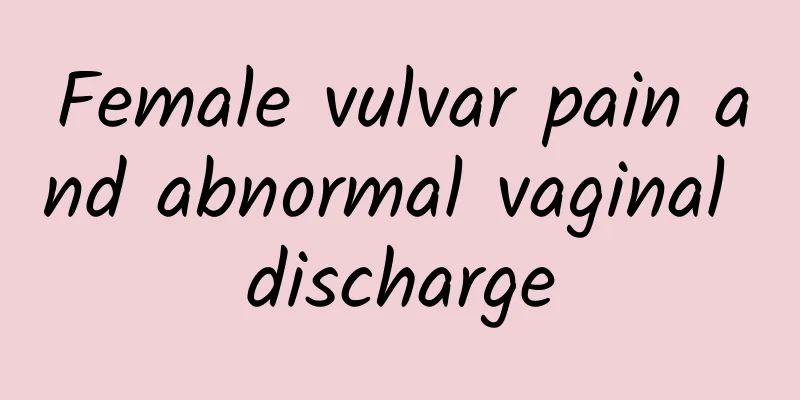What are the causes of irregular menstruation in women? How to treat irregular menstruation in women?

|
Menstrual irregularities are very common in daily life. It is a common gynecological disease in women. The main manifestation is too little or too much menstrual flow, and irregular menstruation. It not only affects the patient's normal life, but also has serious effects on pregnancy and physical health. Let's learn about it together. Causes of irregular menstruation 1. Irregular work and rest schedule. Due to the influence of life or work, people often stay up late or have an irregular work and rest schedule. This bad work and rest habit can easily lead to endocrine disorders and cause irregular menstruation. 2. Excessive weight loss. Uncontrolled weight loss or excessive exercise will result in the body not taking in enough protein and fat, thus affecting the normal synthesis of estrogen in the body, resulting in too little menstrual flow or amenorrhea. 3. Emotional factors: If you are in depression, anxiety or great mental stress for a long time, the function of the hypothalamus will be damaged, the ovaries will not be able to secrete hormones and ovulate, which can easily lead to irregular menstruation. 4. Abortion. Multiple abortions can lead to thin endometrium, uterine damage that is difficult to repair, and even irregular menstruation, amenorrhea, and infertility. 5. Uterine fibroids. Women with uterine fibroids usually experience irregular menstruation, which is mainly manifested by heavy menstrual flow and prolonged menstrual period. The severity of the symptoms depends on the pathological condition of the uterine fibroids. 6. Thyroid problems: If the thyroid function is hyperactive or hypoactive, it will also affect the ovarian function and make menstruation irregular. 7. Impact of IUD. IUD is a foreign body outside the body, which can stimulate the endometrium of women, leading to irregular menstruation and amenorrhea. Symptoms of irregular menstruation 1. Amenorrhea: Long-term menstrual irregularities may cause amenorrhea. The patient will experience pale or sallow complexion, mental fatigue, dizziness, palpitations, shortness of breath, insomnia, weakness in the limbs, pale tongue, and a deep, weak pulse. 2. Oligomenorrhea: refers to a small amount of menstruation, which stops after 1-2 days or stops with a few drops. Symptoms include light red menstrual blood, dull complexion, dry skin, dizziness, palpitations and insomnia, empty pain in the lower abdomen, cold hands and feet, pale tongue, and weak pulse. 3. Excessive menstruation: refers to excessive menstrual flow, which is caused by qi deficiency leading to blood flowing indiscriminately. Common symptoms include light red menstrual color, thin menstrual volume, empty lower abdomen, fatigue, dull complexion, palpitations, shortness of breath, lazy speech, light red tongue with thin white fur, and weak pulse. 4. Color of menstrual blood: Normal blood is dark red, mixed with small pieces of shed endometrial lining, cervical mucus, vaginal epithelial cells, and no blood clots. If the menstrual blood is as thin as water, with only a little pink or black and purple, it is abnormal. If the menstrual blood is completely clotted blood, it is also abnormal, and there may be other bleeding sites. You should see a doctor as soon as possible to ensure your health. 5. Early menstruation: Early menstruation refers to a shortened menstrual cycle, shorter than 21 days, and it occurs for more than 2 consecutive cycles, which is based on ovulatory functional uterine bleeding and menstrual dysregulation. The follicular phase is short, only 7 to 8 days, or the luteal phase is shorter than 10 days, or the body temperature rises by less than 0.5℃. 6. Irregular menstruation: menstruation is early or late, and the cycle is shorter than 21 days or longer than 35 days. Treatment of menstrual irregularities 1. Mainly Chinese medicine conditioning In the treatment of irregular menstruation, it is necessary to make a dialectical treatment based on each person's physical condition, and regulate the functions of various female organs by regulating qi and blood, resolving blood stasis and dispersing nodules, and replenishing Chong and Ren, thereby regulating endocrine balance. 2. Secretion balance therapy supplemented by physical therapy This treatment method for irregular menstruation can quickly eliminate metabolic congestion in the patient's body, balance Qi and blood, and bring the secretion levels of estrogen and progesterone to the optimal physiological state. It has a unique effect in regulating women's irregular menstruation. 3. Try to keep your life regular Staying up late, overwork, and irregular life can all lead to irregular menstruation. Make your life regular and your menstruation may return to normal. 4. See a doctor if necessary If bleeding continues without stopping after 24 hours and the amount of bleeding is heavy, or if your period is light or nonexistent, you should see a doctor immediately. 5. Prevent cold Be sure to avoid wading in the rain during menstruation, and avoid exposing your lower abdomen to cold at all times. |
<<: Why do women have irregular menstruation? What are the causes of irregular menstruation?
Recommend
Early reimbursement of joints? High-risk groups should pay attention to 5 major warning signs
Joint pain is a common nightmare for many people....
What are the correct diagnostic methods for cervical precancerous lesions?
Clinical data show that the cure rate of mid- to ...
Dietary requirements after menopause
During menopause, you need to pay attention to so...
What are the dangers of ovarian cyst rupture?
What are the dangers of ovarian cyst rupture? Is ...
Mid-Autumn Festival turns into "swollen" autumn festival? Be careful of nutritional imbalance when eating barbecue and mooncakes. "Ginseng" can help you improve your protection!
The Mid-Autumn Festival holiday is here, and moon...
Why did I still have my period after taking Mafulong 4 days in advance?
Taking Marvelon 4 days in advance may make you co...
Advances in diagnosis and treatment of bacterial vaginosis
Bacterial vaginosis was once named Haemophilus va...
Women should know the common sense of prevention of ovarian cysts
Ovarian diseases are very common in life, and ova...
The secret of bride's slimming: drink Chinese herbal tea to get rid of fat
Getting married is a major event in life. When th...
What are the common symptoms of uterine fibroids?
What are the main symptoms of uterine fibroids? D...
Potatoes are high GI foods, are they not good for weight loss? Study: Controlling total calories is key
The roasted potatoes smell delicious, but people ...
What are the key points to pay attention to in the treatment of irregular menstruation
Many female compatriots are worried about irregul...
What is uterine effusion?
Uterine effusion is also called intrauterine effu...
Causes of bleeding in urine after menopause
Urine bleeding after menopause may be related to ...
Porridge with preserved egg and tofu is a perfect match for breakfast! Worried about excessive exposure to heavy metal lead? Yan Zonghai teaches the secret of self-protection
Eating porridge for breakfast with a dish of deli...









